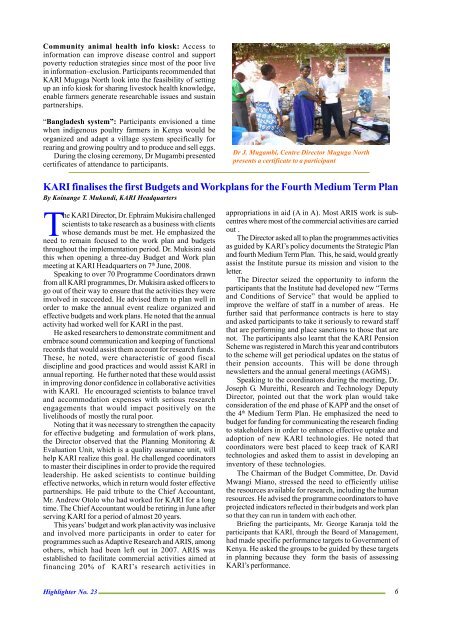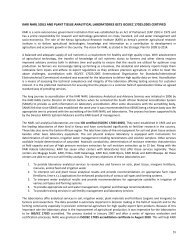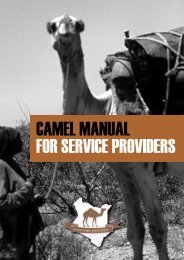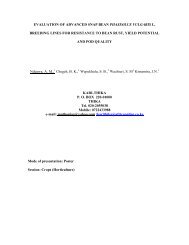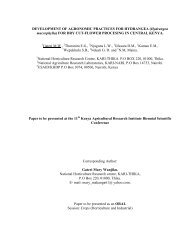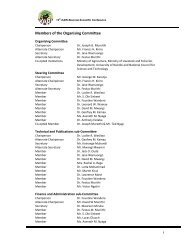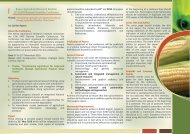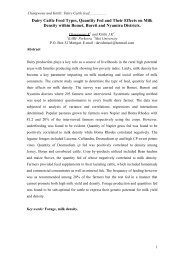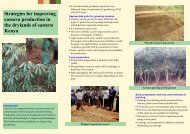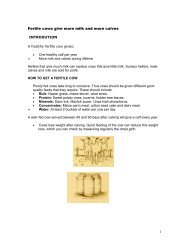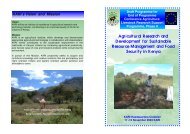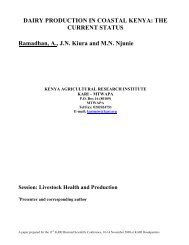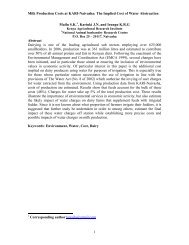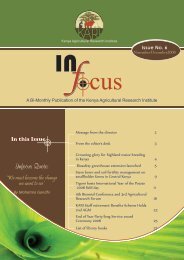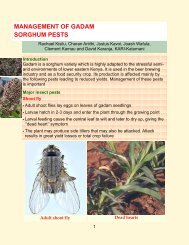January - June 2008 - Kenya Agricultural Research Institute
January - June 2008 - Kenya Agricultural Research Institute
January - June 2008 - Kenya Agricultural Research Institute
You also want an ePaper? Increase the reach of your titles
YUMPU automatically turns print PDFs into web optimized ePapers that Google loves.
Community animal health info kiosk: Access to<br />
information can improve disease control and support<br />
poverty reduction strategies since most of the poor live<br />
in information–exclusion. Participants recommended that<br />
KARI Muguga North look into the feasibility of setting<br />
up an info kiosk for sharing livestock health knowledge,<br />
enable farmers generate researchable issues and sustain<br />
partnerships.<br />
“Bangladesh system”: Participants envisioned a time<br />
when indigenous poultry farmers in <strong>Kenya</strong> would be<br />
organized and adapt a village system specifically for<br />
rearing and growing poultry and to produce and sell eggs.<br />
During the closing ceremony, Dr Mugambi presented<br />
certificates of attendance to participants.<br />
Dr J. Mugambi, Centre Director Muguga North<br />
presents a certificate to a participant<br />
KARI finalises the first Budgets and Workplans for the Fourth Medium Term Plan<br />
By Koinange T. Mukundi, KARI Headquarters<br />
The KARI Director, Dr. Ephraim Mukisira challenged<br />
scientists to take research as a business with clients<br />
whose demands must be met. He emphasized the<br />
need to remain focused to the work plan and budgets<br />
throughout the implementation period. Dr. Mukisira said<br />
this when opening a three-day Budget and Work plan<br />
meeting at KARI Headquarters on 7 th <strong>June</strong>, <strong>2008</strong>.<br />
Speaking to over 70 Programme Coordinators drawn<br />
from all KARI programmes, Dr. Mukisira asked officers to<br />
go out of their way to ensure that the activities they were<br />
involved in succeeded. He advised them to plan well in<br />
order to make the annual event realize organized and<br />
effective budgets and work plans. He noted that the annual<br />
activity had worked well for KARI in the past.<br />
He asked researchers to demonstrate commitment and<br />
embrace sound communication and keeping of functional<br />
records that would assist them account for research funds.<br />
These, he noted, were characteristic of good fiscal<br />
discipline and good practices and would assist KARI in<br />
annual reporting. He further noted that these would assist<br />
in improving donor confidence in collaborative activities<br />
with KARI. He encouraged scientists to balance travel<br />
and accommodation expenses with serious research<br />
engagements that would impact positively on the<br />
livelihoods of mostly the rural poor.<br />
Noting that it was necessary to strengthen the capacity<br />
for effective budgeting and formulation of work plans,<br />
the Director observed that the Planning Monitoring &<br />
Evaluation Unit, which is a quality assurance unit, will<br />
help KARI realize this goal. He challenged coordinators<br />
to master their disciplines in order to provide the required<br />
leadership. He asked scientists to continue building<br />
effective networks, which in return would foster effective<br />
partnerships. He paid tribute to the Chief Accountant,<br />
Mr. Andrew Otolo who had worked for KARI for a long<br />
time. The Chief Accountant would be retiring in <strong>June</strong> after<br />
serving KARI for a period of almost 20 years.<br />
This years’ budget and work plan activity was inclusive<br />
and involved more participants in order to cater for<br />
programmes such as Adaptive <strong>Research</strong> and ARIS, among<br />
others, which had been left out in 2007. ARIS was<br />
established to facilitate commercial activities aimed at<br />
financing 20% of KARI’s research activities in<br />
appropriations in aid (A in A). Most ARIS work is subcentres<br />
where most of the commercial activities are carried<br />
out .<br />
The Director asked all to plan the programmes activities<br />
as guided by KARI’s policy documents the Strategic Plan<br />
and fourth Medium Term Plan. This, he said, would greatly<br />
assist the <strong>Institute</strong> pursue its mission and vision to the<br />
letter.<br />
The Director seized the opportunity to inform the<br />
participants that the <strong>Institute</strong> had developed new “Terms<br />
and Conditions of Service” that would be applied to<br />
improve the welfare of staff in a number of areas. He<br />
further said that performance contracts is here to stay<br />
and asked participants to take it seriously to reward staff<br />
that are performing and place sanctions to those that are<br />
not. The participants also learnt that the KARI Pension<br />
Scheme was registered in March this year and contributors<br />
to the scheme will get periodical updates on the status of<br />
their pension accounts. This will be done through<br />
newsletters and the annual general meetings (AGMS).<br />
Speaking to the coordinators during the meeting, Dr.<br />
Joseph G. Mureithi, <strong>Research</strong> and Technology Deputy<br />
Director, pointed out that the work plan would take<br />
consideration of the end phase of KAPP and the onset of<br />
the 4 th Medium Term Plan. He emphasized the need to<br />
budget for funding for communicating the research finding<br />
to stakeholders in order to enhance effective uptake and<br />
adoption of new KARI technologies. He noted that<br />
coordinators were best placed to keep track of KARI<br />
technologies and asked them to assist in developing an<br />
inventory of these technologies.<br />
The Chairman of the Budget Committee, Dr. David<br />
Mwangi Miano, stressed the need to efficiently utilise<br />
the resources available for research, including the human<br />
resources. He advised the programme coordinators to have<br />
projected indicators reflected in their budgets and work plan<br />
so that they can run in tandem with each other.<br />
Briefing the participants, Mr. George Karanja told the<br />
participants that KARI, through the Board of Management,<br />
had made specific performance targets to Government of<br />
<strong>Kenya</strong>. He asked the groups to be guided by these targets<br />
in planning because they form the basis of assessing<br />
KARI’s performance.<br />
Highlighter No. 23<br />
6


